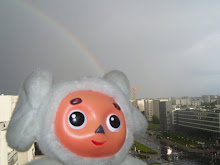It's no secret that poor translations are abound in Poland. From menus ('Cocktail' is usually transcribed as 'coctail'; 'vanilla' is 'vanillia') to museum blurbs (I must note that the Podziema Rynku Museum has excellent translations). Official translations such as "Feel Like at Home" (a slogan from the Euro 2012) have people doing double-takes and taking me aside and saying, "Does this sound right to you?"
Anyway, someone was very gracious enough to give me a bottle of the illustrious Krupnik, a honey-based vodka (note: it is not mead, as mead is a fermented honey 'wine'). It was very, very kind of the person, and I must admit that I was slightly embarrassed because I did not return the favor in kind.
One glance at the label made me slightly cringe:
 |
| The offending label |
Prepared from bees honey and various
spices and aromatic herbs according to
Polish recipes many hundred years old.
Now, here's the thing: if you're going to have some text in English that's big, prominent, and basically being the only representative text of your product/sports tournament/company slogan, you'd think you'd spend that extra amount of money to get it right. That's the thing I don't really understand: this is the main text, essentially the only text that people (mostly Poles anyway (so why in English?)) are going to read, and they turned it into a first semester English project. Some say, "Well, you know what it means anyway." To that I answer, "So it's OK if I go to work and walk around in my bathrobe? I mean, my junk is covered! I've done the most basic amount to appear decent in public."
Well, maybe it's done on purpose to evoke authenticity of its rustic Polishness.
And, let's not forget, what matters most is the content of the bottle, not the label.
Cheers!










